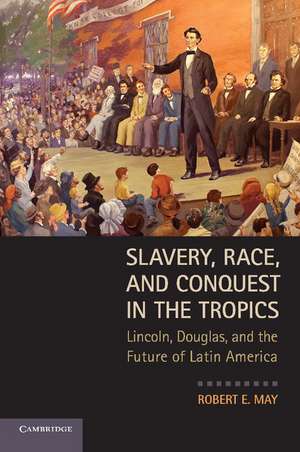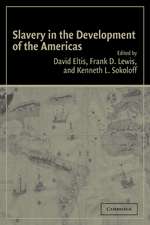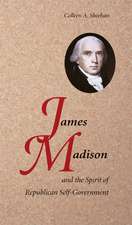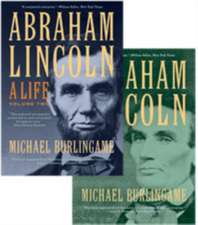Slavery, Race, and Conquest in the Tropics: Lincoln, Douglas, and the Future of Latin America
Autor Robert E. Mayen Limba Engleză Paperback – 6 oct 2013
| Toate formatele și edițiile | Preț | Express |
|---|---|---|
| Paperback (1) | 225.20 lei 6-8 săpt. | |
| Cambridge University Press – 6 oct 2013 | 225.20 lei 6-8 săpt. | |
| Hardback (1) | 633.66 lei 6-8 săpt. | |
| Cambridge University Press – 6 oct 2013 | 633.66 lei 6-8 săpt. |
Preț: 225.20 lei
Nou
Puncte Express: 338
Preț estimativ în valută:
43.09€ • 45.08$ • 35.80£
43.09€ • 45.08$ • 35.80£
Carte tipărită la comandă
Livrare economică 02-16 aprilie
Preluare comenzi: 021 569.72.76
Specificații
ISBN-13: 9780521132527
ISBN-10: 0521132525
Pagini: 310
Ilustrații: 11 b/w illus. 4 maps
Dimensiuni: 150 x 226 x 18 mm
Greutate: 0.43 kg
Ediția:New.
Editura: Cambridge University Press
Colecția Cambridge University Press
Locul publicării:New York, United States
ISBN-10: 0521132525
Pagini: 310
Ilustrații: 11 b/w illus. 4 maps
Dimensiuni: 150 x 226 x 18 mm
Greutate: 0.43 kg
Ediția:New.
Editura: Cambridge University Press
Colecția Cambridge University Press
Locul publicării:New York, United States
Cuprins
1. A spot for manifest destiny; 2. Antilles to Isthmus; 3. Beyond Kansas; 4. Caribbeanizing the house divided; 5. A matter of inches; 6. Freedom in the tropics.
Recenzii
'It is a truism that the issue of slavery's expansion triggered secession and the Civil War. But as Robert May shows in this important study, it was the possible expansion of slavery southward more than the prospect of slavery in Kansas or other Western territories that provoked passionate controversy. This welcome book gives due weight to pro-Cuban annexationists and Central-American filibusters in the coming of war.' James M. McPherson, Princeton University, New Jersey
'As viewed by most nineteenth-century Americans, slavery was a Southern 'problem'; to Abraham Lincoln, it was an American problem. Now Robert May has broken past traditional interpretations and literally expanded the borders of the slavery issue to reimagine it as hemispheric - much the way the proponents of slavery hoped, and its enemies feared. This is a strong, astute, and original study - one everyone interested in the great debate of the Civil War era should read.' Harold Holzer, Chairman, Abraham Lincoln Bicentennial Foundation
'A thoroughly researched and wonderfully fresh account of the politics of slavery expansion that carries the issue beyond the usual territorial disputes to the entire western hemisphere. May enlarges the stage on which the famous Lincoln-Douglas debates were conducted and indeed points a wide-angle lens at the entire sectional crisis and Civil War. Focusing on Abraham Lincoln and Stephen Douglas, [he] demonstrates how discussion of slavery's future in the Americas and various colonization schemes were deeply interwoven in their political careers. A most valuable and original piece of work.' George C. Rable, University of Alabama
'In this engrossing book, Robert May offers a new perspective on the Lincoln-Douglas story. Underscoring their sharply different approaches to American expansion toward Latin America and the Caribbean, May makes a distinctive contribution to antebellum political history by adding a southern dimension to the territorial issue. He argues compellingly that divergent views about Latin America and the Caribbean were critical in the secession crisis. [He] also illuminates the intimate connection between Lincoln's wartime policy toward the region and his views on race. No-one interested in the break-up of the Union and the resulting war can afford to miss this book.' William Cooper, Louisiana State University
'May has made a significant contribution to the study of slavery and expansion in the Civil War era. Using the rivalry between Stephen A. Douglas and Abraham Lincoln as his interpretive lens, May argues that the heated debates over the place of slavery in the future of the US during the 1850s involved not only the North American West but the Latin American tropics as well … Required reading for students of slavery, diplomacy and politics of the Civil War era. Summing up: essential. All academic collections.' K. M. Gannon, Choice
'Unrealistic though these schemes may have been, May makes a strong case that the South's tropical fantasies played an enormous and underappreciated role in causing the Civil War … The unique contribution of this volume is to personalize the dispute over the extension of slavery in the persons of Lincoln and Douglas, placing their contrasting views within the context of the entire Western Hemisphere.' Timothy J. Henderson, Journal of the Early Republic
'Robert E. May is well known for his work on the filibusters - nineteenth-century adventurers who invaded Latin American countries to expand the empire of slavery. He now brings that expertise to bear on the sectional divisions of the antebellum period. Faulting historians of the period for concentrating on western expansion as a cause of the Civil War and largely ignoring tropical expansion, May brilliantly succeeds in filling that knowledge gap.' Nicole Etcheson, The Journal of American History
'This is a refreshing and engaging work that challenges a previously static area of historical inquiry to take on both new evidence and a fuller contextual weighing of events beyond the war's battle lines and the nation's borders. It gives us a Civil War that was both the product of international affairs, and a shaping force on their subsequent course with no less moral gravity than the domestic struggle between slavery and freedom, for just as much was at stake in terms of the intended reaches of southward American expansion and influence.' Phillip W. Magness, Reviews in History
'… makes a compelling case that the possibility of slavery in the tropics profoundly shaped the origins of the Civil War … May's argument, drawn from a deep well of primary sources, is original, persuasive, and important … May's imaginative and skillful reinterpretation of the antebellum careers of Douglas and Lincoln thus underscores the centrality of slavery's expansion to antebellum politics. His book deserves a wide readership.' Graham Peck, Journal of the Illinois State Historical Society
'… changes the landscape both literally and metaphorically - when assessing the fullest meaning of antebellum-era debates in the US about slavery's expansion into the western territories, and accordingly it is an important work. By considering the territory upon which slavery might expand from a hemispheric perspective, May has found the pivot point that repositions the slavery debate by providing significant nuance to the political pronouncements made by proponents and opponents of slavery's geographic expansion. May's thesis is an intriguing one, and it brings together many of the disparate strands of antebellum-era diplomatic history into a compelling narrative united by the common theme of slavery and its potential expansion … provides a fresh perspective to the antebellum-era slavery debates on territorial expansion and it deserves its rightful place as work that changes the map of slavery studies in the United States.' Junius P. Rodriguez, Journal of Illinois History
'… a remarkable book that not only redresses the neglect of the rest of the Americas in the Civil War years, but also situates the North American crisis over slavery symbiotically with plans for slave-imperialism's absorption of Latin America and the Caribbean.' Allen C. Guelzo, The American Historical Review
'Offers original insights on [Lincoln and Douglas'] political rivalry and adds a fascinating new layer to the complex history of this tumultuous era.' Matthew Norman, The Civil War Monitor
'… a creatively written and well-documented exploration of the critical rivalry between Stephen A. Douglas and Lincoln … May has illuminated yet another fascinating dimension of America's imperial history, as well as the centrality of slavery in the nineteenth-century Atlantic world. Teachers and students of this history should read this marvelous book …' Edward Rugemer, Indiana Magazine of History
'Robert May offers a thoughtful, informative, and provocative contribution to the field that will appeal to a wide range of historians. Well written and thoroughly grounded in the sources, the volume should cause book reviews 159 readers to reexamine their views of slavery and expansion in the era - and likely of Lincoln and Douglas as well.' John M. Belohlavek, The Journal of the Civil War Era
'… May has assiduously researched an excellent work, which is a must-read for all who want to better understand the causes of the Civil War.' StrategyPage (www.strategypage.com)
'As viewed by most nineteenth-century Americans, slavery was a Southern 'problem'; to Abraham Lincoln, it was an American problem. Now Robert May has broken past traditional interpretations and literally expanded the borders of the slavery issue to reimagine it as hemispheric - much the way the proponents of slavery hoped, and its enemies feared. This is a strong, astute, and original study - one everyone interested in the great debate of the Civil War era should read.' Harold Holzer, Chairman, Abraham Lincoln Bicentennial Foundation
'A thoroughly researched and wonderfully fresh account of the politics of slavery expansion that carries the issue beyond the usual territorial disputes to the entire western hemisphere. May enlarges the stage on which the famous Lincoln-Douglas debates were conducted and indeed points a wide-angle lens at the entire sectional crisis and Civil War. Focusing on Abraham Lincoln and Stephen Douglas, [he] demonstrates how discussion of slavery's future in the Americas and various colonization schemes were deeply interwoven in their political careers. A most valuable and original piece of work.' George C. Rable, University of Alabama
'In this engrossing book, Robert May offers a new perspective on the Lincoln-Douglas story. Underscoring their sharply different approaches to American expansion toward Latin America and the Caribbean, May makes a distinctive contribution to antebellum political history by adding a southern dimension to the territorial issue. He argues compellingly that divergent views about Latin America and the Caribbean were critical in the secession crisis. [He] also illuminates the intimate connection between Lincoln's wartime policy toward the region and his views on race. No-one interested in the break-up of the Union and the resulting war can afford to miss this book.' William Cooper, Louisiana State University
'May has made a significant contribution to the study of slavery and expansion in the Civil War era. Using the rivalry between Stephen A. Douglas and Abraham Lincoln as his interpretive lens, May argues that the heated debates over the place of slavery in the future of the US during the 1850s involved not only the North American West but the Latin American tropics as well … Required reading for students of slavery, diplomacy and politics of the Civil War era. Summing up: essential. All academic collections.' K. M. Gannon, Choice
'Unrealistic though these schemes may have been, May makes a strong case that the South's tropical fantasies played an enormous and underappreciated role in causing the Civil War … The unique contribution of this volume is to personalize the dispute over the extension of slavery in the persons of Lincoln and Douglas, placing their contrasting views within the context of the entire Western Hemisphere.' Timothy J. Henderson, Journal of the Early Republic
'Robert E. May is well known for his work on the filibusters - nineteenth-century adventurers who invaded Latin American countries to expand the empire of slavery. He now brings that expertise to bear on the sectional divisions of the antebellum period. Faulting historians of the period for concentrating on western expansion as a cause of the Civil War and largely ignoring tropical expansion, May brilliantly succeeds in filling that knowledge gap.' Nicole Etcheson, The Journal of American History
'This is a refreshing and engaging work that challenges a previously static area of historical inquiry to take on both new evidence and a fuller contextual weighing of events beyond the war's battle lines and the nation's borders. It gives us a Civil War that was both the product of international affairs, and a shaping force on their subsequent course with no less moral gravity than the domestic struggle between slavery and freedom, for just as much was at stake in terms of the intended reaches of southward American expansion and influence.' Phillip W. Magness, Reviews in History
'… makes a compelling case that the possibility of slavery in the tropics profoundly shaped the origins of the Civil War … May's argument, drawn from a deep well of primary sources, is original, persuasive, and important … May's imaginative and skillful reinterpretation of the antebellum careers of Douglas and Lincoln thus underscores the centrality of slavery's expansion to antebellum politics. His book deserves a wide readership.' Graham Peck, Journal of the Illinois State Historical Society
'… changes the landscape both literally and metaphorically - when assessing the fullest meaning of antebellum-era debates in the US about slavery's expansion into the western territories, and accordingly it is an important work. By considering the territory upon which slavery might expand from a hemispheric perspective, May has found the pivot point that repositions the slavery debate by providing significant nuance to the political pronouncements made by proponents and opponents of slavery's geographic expansion. May's thesis is an intriguing one, and it brings together many of the disparate strands of antebellum-era diplomatic history into a compelling narrative united by the common theme of slavery and its potential expansion … provides a fresh perspective to the antebellum-era slavery debates on territorial expansion and it deserves its rightful place as work that changes the map of slavery studies in the United States.' Junius P. Rodriguez, Journal of Illinois History
'… a remarkable book that not only redresses the neglect of the rest of the Americas in the Civil War years, but also situates the North American crisis over slavery symbiotically with plans for slave-imperialism's absorption of Latin America and the Caribbean.' Allen C. Guelzo, The American Historical Review
'Offers original insights on [Lincoln and Douglas'] political rivalry and adds a fascinating new layer to the complex history of this tumultuous era.' Matthew Norman, The Civil War Monitor
'… a creatively written and well-documented exploration of the critical rivalry between Stephen A. Douglas and Lincoln … May has illuminated yet another fascinating dimension of America's imperial history, as well as the centrality of slavery in the nineteenth-century Atlantic world. Teachers and students of this history should read this marvelous book …' Edward Rugemer, Indiana Magazine of History
'Robert May offers a thoughtful, informative, and provocative contribution to the field that will appeal to a wide range of historians. Well written and thoroughly grounded in the sources, the volume should cause book reviews 159 readers to reexamine their views of slavery and expansion in the era - and likely of Lincoln and Douglas as well.' John M. Belohlavek, The Journal of the Civil War Era
'… May has assiduously researched an excellent work, which is a must-read for all who want to better understand the causes of the Civil War.' StrategyPage (www.strategypage.com)
Notă biografică
Descriere
Robert E. May internationalizes the American Civil War and reinterprets the 1860 presidential campaign, shedding new light on the Lincoln-Douglas rivalry.

















